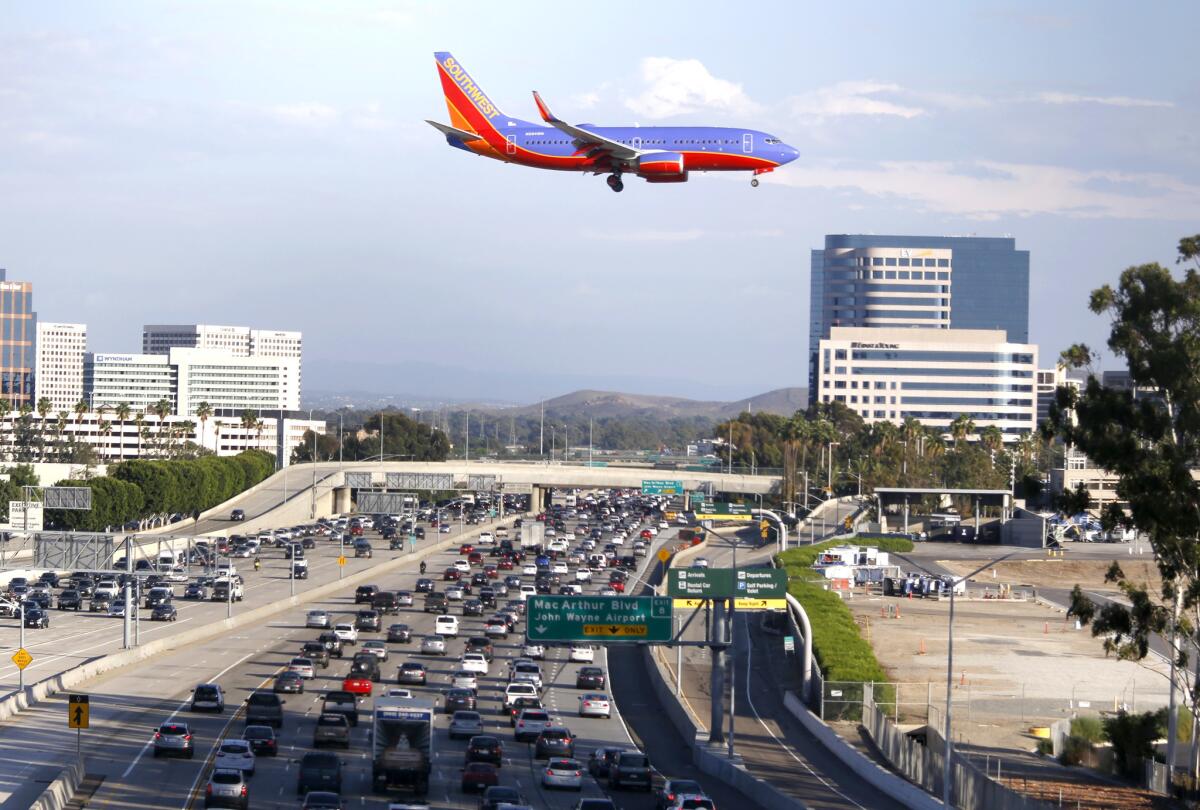Commentary: Why John Wayne Airport needs more competition

A Southwest Airlines plan flies over the 405 Freeway as it approaches the runway at John Wayne Airport.
- Share via
Imagine driving into a gas station where the price is $2 per gallon higher than what other stations charge.
What if you were forced to pay the higher rate because the government gave a special license to the gas station owner, and the next gas station was 22.7 miles away?
This is the situation thousands of individual and small business pilots have faced at John Wayne Airport for more than a decade.
In January, the Orange County Board of Supervisors decided to do something about it by awarding ACI Jet one of two contracts for a fixed-based operator (FBO), according to the Orange County Register.
Join the conversation on Facebook >>
Many of the nation’s more than 590,000 licensed pilots rejoiced because the decision opens up John Wayne to true competition, which will lead to better service, lower prices and facility upgrades.
Unfortunately, the losing bidder, Signature Flight Support Corp., is trying to reverse the decision, protesting to the Federal Aviation Administration, among others, according to the Voice of OC.
Most aircraft in this country are propeller-driven and owned and flown by small business owners and individuals who are not in positions to negotiate lower fees or gas prices.
Consequently, many John Wayne customers feel taken advantage — and many have taken their business elsewhere — because they’ve had no choice but to pay higher fees and gas prices compared to other nearby airports. For example, the Long Beach Airport, where Signature also operates, often charged $1.50 less per gallon than John Wayne, as the media recently reported.
In fact, leading up to the January Board of Supervisors meeting, Signature dropped its price 16%. The other operator, Atlantic Aviation, slashed prices 31%, according to news reports.
Competition is supposed to force market pricing — not a duopoly jockeying to influence a five-member board.
The county has also lost out in the past two years because of missed opportunities to negotiate more rent. There used to be a one-year wait for a tie-down at JWA. Now there are countless empty tie-downs. The county has lost out on those fees, the fuel those planes would have used and hundreds of thousands in lost property tax assessments.
The enormous consolidation in the FBO industry — much of it to Signature, the industry’s largest FBO chain — has resulted in higher prices and questionable new fees to the detriment of private pilots and small business owners.
Fortunately, some talented independent FBOs remain in business. I fly around the country, and I’ve seen the benefit to pilots, airports and government agencies when innovative, independent FBOs compete alongside the Signatures and Atlantics of the industry.
ACI Jet is among them. I fly in and out of San Luis Obispo and Paso Robles airports, where — despite being the only FBO — the company does not charge unreasonable fees or above-market gas prices.
Instead, the company has fostered an outstanding reputation for service and continuously enhances the customer experience. For example, ACI is currently transforming a former American Airlines maintenance hangar at San Luis Obispo that had sat vacant for years into Class A office and administrative space — a $3.2-million investment.
In its complaint to the FAA, Signature didn’t mention anything about a willingness to pay higher rent, provide competitive pricing or upgrade facilities.
Supervisors made the right decision in January. They should do so again next week.
Competition is good, and this deal should fly.
--
GARY SEQUIERA is president of Orange County Flight Center, which has operated at John Wayne Airport for more than 35 years, and a resident of Newport Beach.